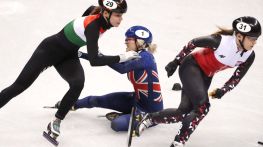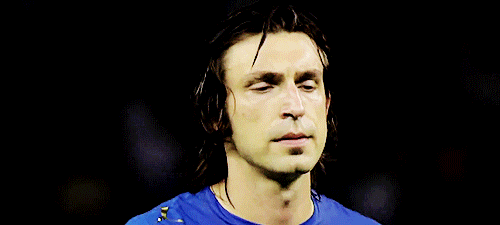Britain had high hopes that speed skater, Elise Christie, would bring home a medal from Pyeongchang.
Christie had previously competed at Vancouver in 2010 where she was unable to reach the top ten in any of her events. At Sochi in 2014, a medal buzz grew following her blistering form in the European Championships, but there was heartbreak instead. She was disqualified from the 500m final for colliding with the Italian, Arianna Fontana. In the 1500m event, Christie was disqualified for not crossing the finishing line. And in the 1000m semi-final, she was disqualified for a third time for colliding with Jianrou Li. The amount of harassment directed towards the speed skater on Twitter led her to close her account.

Christie entered the 2018 Winter Olympics, as a double world champion and was nicknamed the fastest woman on ice. The speed skater was hailed as Team GB’s most likely medal winner. Christie started the Winter Games well, qualifying for the 500m easily and setting an Olympic record. In interviews, she was happy with her performance, saying she wasn’t even at her best yet. It wasn’t to be. Van Kerkhof’s skate clipped her hand and she crashed out. Despite finishing 1st in the 1500m event, Christie collided with Li Jinyu and was once again disqualified; the collision caused Christie an ankle injury which put her participation in the 1000m in doubt. She did compete in her heat, but fell before the first corner, meaning the race was restarted, then finished 2nd but was carried off in pain. Judges disqualified Christie for causing two separate collision incidents, putting any dreams of medals well and truly to bed.
So what’s next for Elise Christie?
Firstly, get off the ice. Recover from the injury and take some time away from the sport. She has confirmed she will be back for the 2022 Winter Olympics; if she qualifies, she will be 31 years old and that will likely be her last opportunity to show what she can do.
It’s time to rebuild and time to reassess. To face major competitions again, Elise needs to ensure she is mentally tough. Mental toughness can be described as the ability to achieve personal goals in the face of pressure from a wide range of different stressors; it encapsulates resilience, hardiness, tough-mindedness, and the ability to cope.
Why is it important? Mental toughness influences:
- Attitude: people’s belief and commitments
- Training: motivation, environmental control, able to push self to the limits
- Competition: ability to handle pressure, self-belief, regulating performance, staying focused, and in control of thoughts
- Post-competition: ability to handle failure or success
Elise has faced these hardships before and went into South Korea feeling much stronger than Sochi, but now she’s back to square one. Few athletes will experience the same number of devastations on the Olympic stage, and the worst outcome is for Elise to question whether all the hard work was worth it.
The good news for Elise is that she has shown her pace and shown she is capable of making the podium. Now, she must work on staying mentally tough to be able to withstand these setbacks; this can be achieved through many avenues.
Environment: Influence of parents, childhood background, and experiencing and surviving early set-backs
Character: Independence, self-reflection, resilience
Tough Attitudes: Exploit learning opportunities, go the extra mile, be willing to take risks, and set challenging targets
Tough Thinking: Able to think clearly and robustly about self-confidence

In terms of Christie’s psychological development, it’s crucial that she continues to challenge herself and surrounds herself with the right support. There are four general dimensions to developing mental toughness:
1. Sport Process – this is hinged on training and competing: Elise must ensure training is consistent well-prepared, and simulates competition. Competitions should include both good and bad experiences, across different environments, and consistency should be achieved.
2. Sport Personnel – Coach; the coach should employ transformational leadership, instil hard work and discipline, and provide emotional support and motivation. Teammates; need to provide encouragement and rivalries as well as providing emotional support. Although Elise competes alone, she’s part of the speed skating team from Great Britain as well as the wider Team GB umbrella.
3. Non-Sport Personnel – Elise should look to parents, siblings, and her partner for motivation, encouragement, belief, and feedback.
4. The Environment – Within the training environment, hard work, competitive attitudes, and determination needs to be instilled. The family environment should display an interest in speed skating as well as promote hard work and a never give up attitude. Lastly, Elise needs someone she can model from – which is difficult when you’re the fastest woman on ice.
Can mental toughness really protect an individual from heartache when the pressure is so great?
There is an argument that the pressure placed on her by Team GB was just too much. Elise was expected to bring home a medal; a double world champion is expected to make the podium – but she choked, again. Sports is a business.

The women’s bobsleigh team had no funding and instead raised their own money to attend the games where they achieved Britain’s best ever result. Conversely, the men’s bobsleigh under performed – woefully – and their funding will likely be cut. Money has been ploughed into the skeleton with great results; Lizzy Yarnold defended her gold medal and Britain achieved a men’s and a women’s bronze. What next for speed skating? It received close to £5 million in the run up to the games to achieve results, but was it worth it? UK Sport have said that they will not cut it, as long as Christie commits to Beijing 2022 as they still believe she has a chance of making the podium.
Elise Christie has proved she has the ability, now she needs consistency and the way to do that is ensuring mental toughness throughout all aspects of her life.







